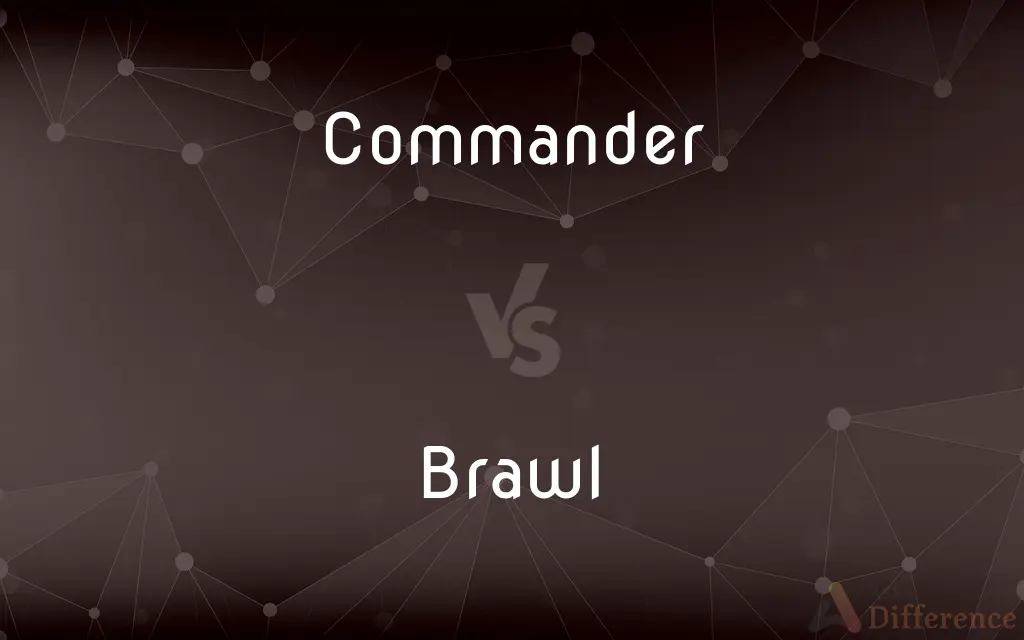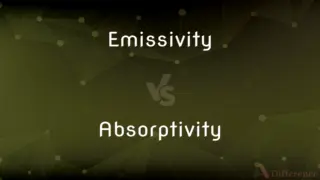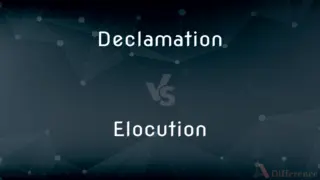Commander vs. Brawl — What's the Difference?
Edited by Tayyaba Rehman — By Urooj Arif — Updated on March 31, 2024
Commander is a multiplayer Magic: The Gathering format with 100-card decks led by a legendary creature, focusing on social gameplay, while Brawl is a variant that blends Commander's rules with Standard's rotating card pool.

Difference Between Commander and Brawl
Table of Contents
ADVERTISEMENT
Key Differences
Commander, also known as EDH (Elder Dragon Highlander), is a popular multiplayer format in Magic: The Gathering that emphasizes social interactions and creative deck building around a legendary creature or planeswalker. Decks must contain exactly 100 cards, including the commander, with no other copies of any card except basic lands. On the other hand, Brawl is a more recent format designed to be accessible and dynamic, combining the singleton rule and commander concept of Commander with the rotating card pool of Standard, leading to a constantly evolving meta.
In Commander, the legendary commander dictates the color identity of the deck, and players start with 40 life. This format allows for cards from the entirety of Magic's history, barring a specific ban list, fostering a vast and diverse playground for deck builders. Whereas Brawl, with its Standard-based card pool, limits the available cards to those currently legal in Standard, making it easier for new players to start while keeping the format fresh and changing with each set release.
Commander games are typically played in groups of four, where social interaction and politics can play a crucial role in the game's dynamics. The format encourages creative strategies and synergies around the chosen commander. Brawl, while it can also be played in multiplayer settings, is often seen in both 1v1 and small groups, offering a more streamlined and faster-paced experience due to the smaller card pool and the 30 life starting point.
One unique aspect of Commander is the "command zone," from which players can cast their commander multiple times, paying an additional mana cost for each subsequent casting. This rule also applies in Brawl, but the faster rotation and smaller card pool mean that strategies and available commanders change more frequently, impacting deck-building decisions and gameplay strategies.
Commander's popularity has led to the creation of a wide variety of themed and competitive decks, with a strong community and numerous resources for players to dive into. Brawl, being newer and with its rotating format, has a smaller but growing community, offering a bridge for Standard players to explore the social and strategic depths of a commander-like experience without the extensive card collection required for traditional Commander.
ADVERTISEMENT
Comparison Chart
Deck Size
100 cards, including the commander
60 cards, including the commander
Card Pool
All Magic: The Gathering cards, with exceptions
Standard-legal cards only
Life Total
Starts at 40
Starts at 30
Format Type
Singleton, no duplicates except basic lands
Singleton, no duplicates except basic lands
Player Format
Multiplayer, usually 4-player games
Multiplayer or 1v1
Rotation
Non-rotating, cards remain legal
Rotating, aligned with Standard's rotation
Compare with Definitions
Commander
Promotes a social, multiplayer experience with unique rules like the command zone.
In Commander, diplomacy can be as important as the cards you play.
Brawl
Features 60-card decks, including a legendary commander, and a 30 life total.
Brawl games are generally faster-paced than Commander due to the smaller decks and life totals.
Commander
The Gathering format with a legendary commander guiding deck construction.
Commander games often feature elaborate strategies and long, interactive turns.
Brawl
Requires all cards to be Standard-legal, ensuring a constantly evolving meta.
Brawl's rotating nature keeps the format fresh and accessible for newer players.
Commander
Allows cards from nearly all sets, leading to diverse and creative decks.
Commander decks range from highly competitive to thematic and casual.
Brawl
Serves as a bridge for Standard players to explore more social and strategic gameplay.
Brawl introduces Standard players to the complexities and fun of a commander-centric format.
Commander
Players start with 40 life, accommodating longer and more epic battles.
The higher life total in Commander enables more comeback opportunities.
Brawl
Can be played in both multiplayer and 1v1 settings, offering flexibility.
Brawl matches can adapt to the number of players available, from duels to full multiplayer chaos.
Commander
Encourages thematic deck building around the commander's abilities.
A Commander deck's strategy often revolves around its commander's unique mechanics.
Brawl
The Gathering format blending Commander's style with Standard's rotating card pool.
Brawl allows players to use their Standard cards in a new, singleton format.
Commander
Commander is a common naval officer rank. Commander is also used as a rank or title in other formal organizations, including several police forces.
Brawl
A noisy quarrel or fight.
Commander
A person who commands, especially a commanding officer.
Brawl
(Slang) A loud party.
Commander
A commissioned rank in the US Navy or Coast Guard that is above lieutenant commander and below captain.
Brawl
To quarrel or fight noisily.
Commander
One who holds this rank or a similar rank in another military organization.
Brawl
A disorderly argument or fight, usually with a large number of people involved.
Commander
The chief commissioned officer of a military unit regardless of rank.
Brawl
A type of dance move or step.
Commander
An officer in some knightly or fraternal orders.
Brawl
Alternative form of branle
Commander
One who exercises control and direction of a military or naval organization.
Brawl
(intransitive) To engage in a brawl; to fight or quarrel.
Commander
A naval officer whose rank is above that of a lieutenant commander and below that of captain.
Brawl
(intransitive) To create a disturbance; to complain loudly.
Commander
One who exercises control and direction over a group of persons.
Brawl
(intransitive) Especially of a rapid stream running over stones: to make a loud, confused noise.
Commander
A designation or rank in certain non-military organizations such as NASA and various police forces.
Brawl
(transitive) To pour abuse on; to scold.
Commander
(obsolete) The chief officer of a commandry.
Brawl
To move to and fro, to quiver, to shake.
Commander
A heavy beetle or wooden mallet, used in paving, in sail lofts, etc.
Brawl
To quarrel noisily and outrageously.
Let a man that is a man consider that he is a fool that brawleth openly with his wife.
Commander
A rank within an honorary order: e.g. Commander of the Legion of Honour.
Brawl
To complain loudly; to scold.
Commander
Any of various nymphalid butterflies of the Asian genus Moduza.
Brawl
To make a loud confused noise, as the water of a rapid stream running over stones.
Where the brook brawls along the painful road.
Commander
A chief; one who has supreme authority; a leader; the chief officer of an army, or of any division of it.
A leader and commander to the people.
Brawl
A noisy quarrel; loud, angry contention; a wrangle; a tumult; as, a drunken brawl.
His sports were hindered by the brawls.
Commander
An officer who ranks next below a captain, - ranking with a lieutenant colonel in the army.
Brawl
An uproarious party
Commander
The chief officer of a commandery.
Brawl
A noisy fight in a crowd
Commander
A heavy beetle or wooden mallet, used in paving, in sail lofts, etc.
Brawl
To quarrel noisily, angrily or disruptively;
The bar keeper threw them out, but they continued to wrangle on down the street
Commander
An officer in command of a military unit
Commander
Someone in an official position of authority who can command or control others
Commander
A commissioned naval officer who ranks above a lieutenant commander and below a captain
Commander
An officer in the airforce
Common Curiosities
How does Brawl ensure a changing gameplay environment?
Brawl's reliance on the Standard card pool means its available cards rotate annually, keeping the format fresh and dynamic.
Can I play Brawl or Commander online?
Yes, both formats are supported on platforms like Magic: The Gathering Arena and Magic Online, allowing players to enjoy the formats digitally.
What makes Commander unique compared to other Magic formats?
Commander's uniqueness lies in its 100-card singleton rule, the use of a legendary commander, and its emphasis on social, multiplayer gameplay.
Can Commander decks be used in Brawl games?
No, because Brawl has a smaller deck size and only allows Standard-legal cards, whereas Commander decks include cards from across Magic's history.
What is the command zone?
The command zone is a game area where commanders start the game and can return to when removed from play, allowing players to cast them again.
How do life totals differ between Commander and Brawl?
In Commander, players start with 40 life, whereas in Brawl, players start with 30 life, reflecting the formats' differing paces and scales.
Are there any banned cards in Commander or Brawl?
Yes, both formats have their own ban lists to maintain balanced and enjoyable gameplay, with Commander's list being broader due to its larger card pool.
How does the rotating nature of Brawl affect deck building?
Brawl players must adapt their decks to the changing Standard card pool, making the format more accessible but requiring updates to decks over time.
How does the Standard rotation benefit Brawl players?
Standard rotation keeps Brawl fresh and accessible, encouraging players to continuously explore new strategies and preventing stagnation.
Is deck building more challenging in Commander or Brawl?
Deck building in Commander can be more challenging due to the vast card pool and need for creative synergy, while Brawl's Standard limitation makes it more straightforward.
What is the recommended number of players for Commander and Brawl games?
Commander is typically played with four players, while Brawl can be enjoyed in both multiplayer and 1v1 formats.
How do new Magic sets impact Commander and Brawl?
New sets can introduce powerful new commanders and strategic options for Commander, while significantly altering the playable card pool and meta in Brawl.
What role do social interactions play in Commander?
Social interactions are a key part of Commander, influencing alliances, trades, and overall game dynamics, making it as much about the players as the cards.
What are some strategies to adapt when moving from Brawl to Commander?
Players moving from Brawl to Commander should prepare for longer games, more complex interactions, and the challenge of building with a larger card pool.
Can the same commander be used in both formats?
Yes, if the commander is Standard-legal, it can be used in both Brawl and Commander, but the deck compositions will differ significantly.
Share Your Discovery

Previous Comparison
Emissivity vs. Absorptivity
Next Comparison
Declamation vs. ElocutionAuthor Spotlight
Written by
Urooj ArifUrooj is a skilled content writer at Ask Difference, known for her exceptional ability to simplify complex topics into engaging and informative content. With a passion for research and a flair for clear, concise writing, she consistently delivers articles that resonate with our diverse audience.
Edited by
Tayyaba RehmanTayyaba Rehman is a distinguished writer, currently serving as a primary contributor to askdifference.com. As a researcher in semantics and etymology, Tayyaba's passion for the complexity of languages and their distinctions has found a perfect home on the platform. Tayyaba delves into the intricacies of language, distinguishing between commonly confused words and phrases, thereby providing clarity for readers worldwide.














































